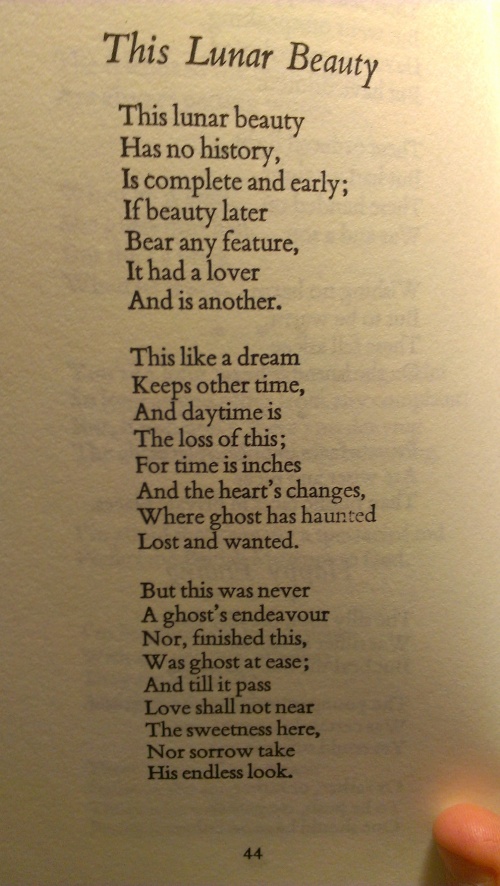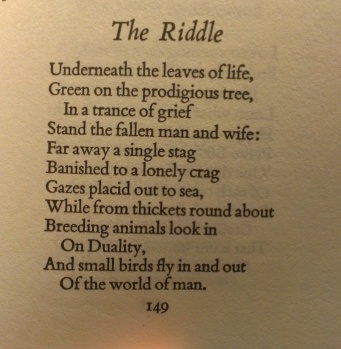Auden’s Riddles
by onepuzzledspecies
“One must begin by distinguishing between riddle, which is, I believe, a fundamental element in poetry, and obscurity, which is an aesthetic vice.”
During my stay in the U.S., I liked to walk around in the library and pick out books from the shelves at random. (Actually, that is a good principle for knowledge searching in any setting: If you go straight for the titles or other kind of information you are looking for, you could miss out on so many valuable coincidences!) When we had been assigned some of Auden’s early poetry in class, which is, not surprisingl,y often more difficult than his more famous, popular poems, I realized I would need some assistance. Arriving at the Auden shelf (shelves, in fact) I counted to four and picked out a random volume, which turned out to be John Blair’s The Poetic Art of Auden.
One phrase from Blair’s book stuck with me and became, I think, one crucial reason that I bothered reading more of early Auden. Blair writes that Auden attempts to “trap the reader into self-awareness by indirect means,” which I always remembered incorrectly as tricking the reader into self-awareness. This is a good description of the effect of a good poem: To find oneself suddenly convinced or enlightened about something (Blair writes: “surprised, shocked, seduced”) without really knowing how it happened. Partly as a way to reject the direct communication of moral truth, as Blair puts it, Auden frequently chose the form of the allegory for his poems, with its “associated control of emotive faculties by rationality.” This meant that he would employ “the poetic ornamentation of simple questions and answers by casting them in the form of riddles.”
The awareness of the riddle aspect in Auden’s poetry has often steered my attention in later interpretations. Solving a riddle is fun in and of itself, and when dealing with poetry one gets the aesthetic-verbal reward in addition: I say we stop calling ourselves “literary critics” and start referring to ourselves as detectives of the sublime! (With a cheerful nod to Bolaño)
Recently reminded of my love of riddles, I thought I’d present a selection of Auden’s. WordPress insists on making line spaces double, hence the photographs instead. First an early one:
The poem Auden titled “The Riddle” (1939) is actually not so much a riddle as an allegory, one of Auden’s many allegories on “Man” or the human condition. (I’ll have to do another post on those —) Here is the first stanza, the last two lines of which have echoed in my head for years:
The rest can be found on Poemhunter.
Speaking of mysteries – Auden was also an obsessive reader of detective fiction. As “formula fiction,” he claims that they have nothing to do with art, but that they are excellent for throwing light on the function of art. The main interest in a detective story is, he writes, “the dialectic of innocence and guilt.” He then goes on, in characteristic fashion, to draw up a scheme of the narrative stages of a successful story. As this quote perhaps indicates, Auden’s analysis of detective stories has a large theological component. The typical reader of detective stories is described, for instance, as someone “like myself, a person who suffers from a sense of sin.” The “magic formula” of what the Germans call Krimis is “an innocence which is discovered to contain guilt; then a suspicion of being the guilty one; and finally a real innocence from which the guilty other has been expelled, a cure effected, not by me or my neighbors, but by the miraculous intervention of a genius from outside who removes guilt by giving knowledge of guilt.”
I highly recommend reading the whole analysis, which is available here.
The last pair of riddles I want to mention have to do with ogres. The first is called “Song of the Ogres,” and can be read here. I can’t remember when it was written at the moment, but think it was an early one? Here’s the second:
The Ogre does what Ogres can,
Deeds quite impossible for Man.
But one prize is beyond his reach,
The Ogre cannot master Speech:
About a subjugated plain,
Among its desperate and slain,
The Ogre stalks with hands on hips,
While drivel gushes from his lips.
This title of this poem was “August 1968,” and its topic was transparent on purpose: As Joseph Brodsky, who was to become one of Auden’s most ardent admirers, laconically notes: “I had translated several poems of his into Russian and took them to a magazine in Moscow; but the year happened to be 1968, the Soviets invaded Czechoslovakia, and one night the BBC broadcast his “The Ogre does what Ogres can…” and that was the end of this venture.”
- John G. Blair: The Poetic Art of W. H. Auden (Princeton University Press, 1965.)
- “This Lunar Beauty” copied from Auden’s Collected Shorter Poems, 1927-1957 (Faber and Faber, 1966.)
- “August 1968” quoted in Edward Mendelson’s Later Auden (Farrar, Straus and Giroux, 1999.)
- Joseph Brodsky’s quote comes from his essay collection Less Than One: Selected Essays. (Farrar, Straus and Giroux, 1986)

